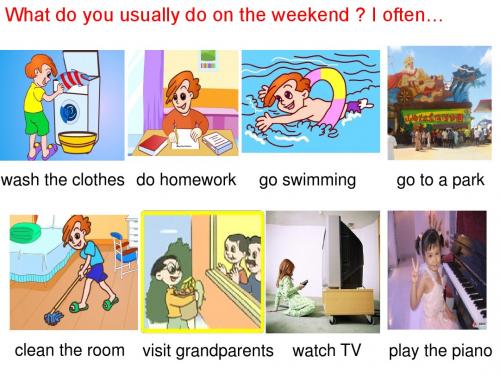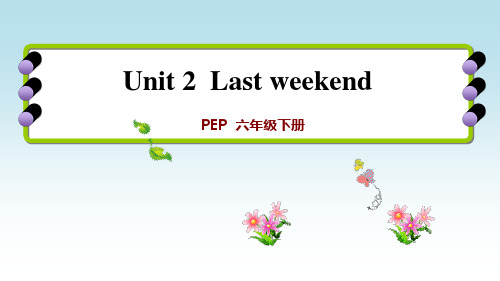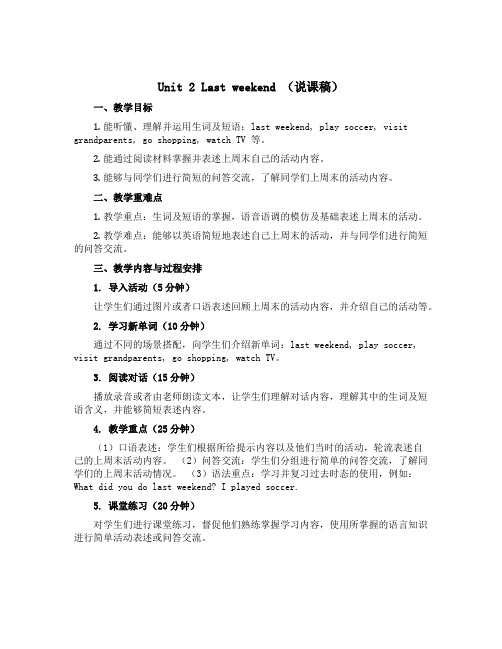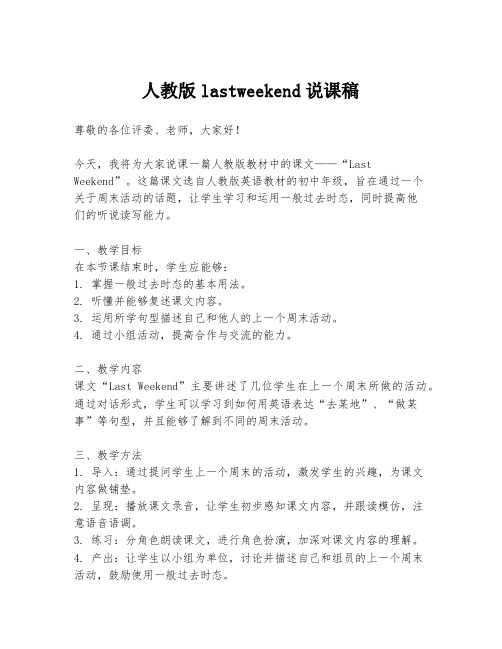六年级英语下册第二单元lastweekend测试题讲课讲稿
PEP六年级英语下册第二单元Last weekend教案讲课讲稿

Unit 2 Last weekendPeriod 1 Section A Let’s learn / Do a survey and reportLearning aims(学习目标)1.四会单词或词组:cleaned, washed, watched, stayed, cleaned my room ,washed my clothes ,stayed at home ,watched TV.2.理解句子:How was your weekend ?It was fine ,thanks .What did you do ? I stayed at home and watched TV.3.学唱歌曲《Last weekend》.Important &difficult points(重难点)重点:学习单词或词组以及句子。
难点:掌握动词过去式的读音。
[教学过程]Step1 : 预习温故1、Go over the words:young-younger,old-older,tall-taller,short-shorter,long-longer,small-smaller,big-bigger,stronger.2、Free talk :T: I’m 28. How old are you ? S: I ’m 12years old.I’m younger than you .T: I’m 1.65meters. How tall are you ? S: I ’m 1.61 metres. I’m shorter than you .T:I’m 48kg.How heavy are you ? S: I ’m 40kg. T:I’m heavier than you.3. T: I often clean my room on the weekend.T: What do you do on the weekend ?S: I often clean my room on the weekend. (多操练)T:Today we’ll learn U.2 Last weekend. (板书教读)Step 2. 新课内容展示Let’s learn1.New phrases: cleaned ,washed ,watched ,stayed ,cleaned my room ,washed my clothes ,stayed at home ,watched TV.(1)T板书下列单词的原形clean ,wash ,watch, stay,并用I often clean my room /…造句。
小学英语六年级下册(PEP人教版)Unit 2 last weekend.公开课课件

连词成句。(10分) 1.was,weekend,your,how , (?) ____________________? How was your weekend
2.fine,was,it ,(.) It was fine. ____________
3.did,what,do, last, weekend, what, (?) What did you do last weekend?. ____________________________
last [lɑ:st] weekend
[wi:kend] ( 上一个周末)
last week
this weekend
watch TV
watched TV
/t/
What did you do last weekend?
wash my clothes
washed my clothes
/t/
What did you do last weekend?
【常见用法1】 TV show 【常见用法2】 children’s show 【例】 I watched some children’s shows on TV.
do something else
【例】I must do something else. 【例】 Did you do anything else?
What do you usually do on the weekend ? I often…
March
日历 一
MON.
二
TUS.
三
四
五
六
SAT.
日
SUN.
一
MON.
二
TUS.
人教版六年级英语下册 Unit 2 Last weekend 整单元课件

快快长大:英式下午茶
17世纪时,下午茶在英国上流社会流行起来。喝下午 茶的最正统时间是下午四点钟。正统的英式下午茶的 点心是用三层点心瓷盘装盛,第一层放三明治、第二 层放传统英式点心Scone、第三层则放蛋糕及水果塔, 由下往上吃。至于Scone的吃法是先涂果酱、再涂奶 油,吃完一口,再涂下一口。
易错点 提示 问句中的did是助动词do的过去式,do是实义 动词,意为“做”,用动词原形。
例句:你昨天做什么了?
What did you do yesterday? ( √ )
What did you did yesterday? ( × )
知识点3 drank /dræŋk/ v. 喝
They drank coffee in the afternoon. 他们下午喝了咖啡。
Mike washed his clothes yesterday. 迈克昨天洗了他的衣服。
washed hands 洗手
watched /wɒtʃt/ v.(watch的过去式)看
Chen Jie watched a football match yesterday. 陈杰昨天看了一场足球赛。
我是小记者 每个同学扮演小记者用句型What did you do last weekend? 采访自己的好朋友4-5人。 在活动中可以用到的短语: cleaned my room,washed my clothes,watched TV, played football,listened to music等。
Read and Answer Q1 What did Mike’s Grandpa do last weekend? Q2 What did Mike do last weekend?
六年级英语下册Unit2LastweekendPartBLetstalk教学课件人教PEP版

read a book
slept
saw a film
wash my clothes do my homework
clean the room
listen to music
What do you usually do on weekends?
read a book
stayed at home
watered played
studied worried used skated
read— read do— did has/have— had am/is— was see— saw sleep─ slept
不规则动词
3. Was the magazine interesting? Yes, it was.
4. What are John and Amy going to do? They are going to go to the bookstore.
1、直接加 ed
2、辅音加y结尾, y变i加ed
3、e结尾直接加d
sleep
See a film
Let’s try
bookstore
Hey, Amy. Let’s go to the bookstore. I want to buy the new film magazine.
Oh. I read it last weekend.
Was it iBiblioteka teresting?PEP8 Unit2 Last weekend
• B Let’s talk
washed my clothes did my homework
listened to music cleaned the room
六年级英语下册Unit2LastweekendPartALetstalk教学课件人教PEP

He stayed at home, drank tea and watched TV.
Homework
1 Listen and read P.14 for 6 times. 2 Copy the four-skilled sentences for 3 times. 3 Ask your friends “What did you do last weekend?”
Unit 2 Last weekend
A Let’s talk
by Guan Xiaoyu from Changpu Primary School
•
A: What do you usually do on the weekend?
B: I usually …
一 二三四 五
MON. TUS. WEN. THUR. FRI.
I cleaned my room.
last Saturday
wash my clothes washed my clothes /t/
I washed my clothes.
last weekend
stay at home stayed at home /d/
I stayed at home.
It was good, thank you.
It was fine, thanks. It was great. It was OK.
It wasn’t very good.
Pair-work
A: How was your weekend? B: It was ______. (good, fine, OK, great)
Unit2LastweekendALet'stalk(课件)人教PEP版英语六年级下册

A Let’s talk
How was your weekend?
It was good, thank you. It was fine, thanks. It was great. It was OK.
It wasn’t very good. It was bad.
B: It was ...
A: What did you do last weekend?
B: I
.
A: That's nice/...
Let’s try
Sarah: Tomorrow is Monday. We’ll have class again soon. Mike: Yes, we will.
watched TV washed my clothes
stayed at home played football
drank tea
did homework
cleaned my room watched movies listened to music
A: How was your weekend?
What did Mike watch on TV?
What did Mike watch? He watched some children's shows on TV.
A: How was your weekend? B: It was ... A: What did you do last weekend? B: I .... A: Did you do anything else? B: I ..., too.
A: What are you going to do next weekend? B: I'm going to ... on Saturday.
Unit 2 Last weekend(说课稿)- 2022-2023学年英语六年级下册

Unit 2 Last weekend (说课稿)一、教学目标1.能听懂、理解并运用生词及短语:last weekend, play soccer, visit grandparents, go shopping, watch TV 等。
2.能通过阅读材料掌握并表述上周末自己的活动内容。
3.能够与同学们进行简短的问答交流,了解同学们上周末的活动内容。
二、教学重难点1.教学重点:生词及短语的掌握,语音语调的模仿及基础表述上周末的活动。
2.教学难点:能够以英语简短地表述自己上周末的活动,并与同学们进行简短的问答交流。
三、教学内容与过程安排1. 导入活动(5分钟)让学生们通过图片或者口语表述回顾上周末的活动内容,并介绍自己的活动等。
2. 学习新单词(10分钟)通过不同的场景搭配,向学生们介绍新单词:last weekend, play soccer, visit grandparents, go shopping, watch TV。
3. 阅读对话(15分钟)播放录音或者由老师朗读文本,让学生们理解对话内容,理解其中的生词及短语含义,并能够简短表述内容。
4. 教学重点(25分钟)(1)口语表述:学生们根据所给提示内容以及他们当时的活动,轮流表述自己的上周末活动内容。
(2)问答交流:学生们分组进行简单的问答交流,了解同学们的上周末活动情况。
(3)语法重点:学习并复习过去时态的使用,例如:What did you do last weekend? I played soccer.5. 课堂练习(20分钟)对学生们进行课堂练习,督促他们熟练掌握学习内容,使用所掌握的语言知识进行简单活动表述或问答交流。
6. 课堂总结(5分钟)让学生回顾今天课程的学习内容,重点复习生词、短语及表述句式,并鼓励学生们多进行口语表述训练。
四、教学反思通过本次教学,我在结合场景进行单词学习的方法更加深刻了发现,同时,我还发现学生们在对话阅读及表述方面需要多加训练,以提高其语言能力和口语表达水平。
Last-weekend-B-说课稿

《Unit 2 Last weekend》 B Let's learn说课稿一、说教学内容我今天讲课的内容是pep小学英语六年级下册Unit2 B Let's learn。
二、说教材简析本节主要让学生掌握五个动词短语的过去式,让学生能够利用这些短语进行描述自己过去的时间里所做的事情,运用主要句型询问他人在过去的时间里做过什么?在前面学生已经学习了这些短语,并且掌握了一般现在时,现在进行时,一般将来时的用法,教学时我主要采用了以旧引新的教学方法。
三、说教学目标1.掌握四会词组: read a book, saw a film, had a cold, slept .2.理解认读句子:“ What did you do last weekend ? I saw a film. Did you like it ? Yes, I did 。
I t was great.”3、在学习过程中培养学生学习英语的兴趣,并教育学生要合理安排周末时间.四、说教学重点掌握动词短语的过去式以及就过去时间所做的事情进行简单回答。
五、说教学难点1.重点:听、说、读、写四会单词和短语。
2.难点:掌握不规则动词过去式的拼写和发音。
六、说教法、学法1。
教法设计在应用任务型教学法的大前提下,我利用情景教学法,以学生为中心,以交际为主线,通过一系列的教学活动吸引学生的注意力。
2.学法指导在本课的学习活动中,我用多媒体课件辅助教学,以多种合作学习的方式来帮助学生自己发现和解决问题,让学生在互动和交流中建立自信,感受学习的快乐。
3。
教学手段用多媒体辅助教学,将英语学习和游戏、互动结合,引导学生积极主动地投入到学习活动中来。
七、说教学过程1.复习导入(1)利用话题交流复习了本单元A部分所学的五个动词短语的过去式构成及一个主要句型,与本节课要学的两个不规则动词的过去式形成对比,同时为本节课继续学习一般过去时做了一个很好的铺垫。
新人教版英语六年级下册《Last weekend》优质教学课件

Last weekend Part A
Introduce
T: How are you? S: I’m fine. T: I like reading. So I always watch TV at the weekend. What about you?
Words
did [dɪd]
______A_____do you like the novel? A. How B. What C. Who
Expressions
Did you do anything else? 你还做了其他什么事吗?
此句中的did为助动词,是do的过去式。
eg: Did you go to school yesterday? 你昨天去学校了吗?
作动词,意为“做”。是do的过去式。 eg: I did it because they asked me to do it!
我做这事是因为他们请我做啊! I did my homework yesterday. 我昨天写作业了。 小练习:填空:
I _____d_i_d___(做)my homework yesterday.
Expand
Thursday(星期四)在北欧神话中,最有权势、最勇敢的神要数雷神Thor。他相当于罗马神话 里的主神Jupiter /Jove。当Thor驾着公山羊拉的战车奔驰而过时,天空顿时雷轰电闪。 Thursday正是以Thor命名的,它在古英语原作Thuresdaeg,意即the day of Thor。 Friday(星期五)在古英语中,Fri- day原作Frigedaeg,意即the day of Frigg /Freya。Frigg / Freya乃北欧爱情女神,亦即战神Woden之妻,由于沉溺于奢侈的生活而遭丈夫遗弃。该女神相 当于罗马神话中的Venus,罗马人以Venus来命名星期五,称之为Dies Veneris,意即the day ofVenus,而英语借译该词时把Venus换成Frigg,作Frigedaeg。 Wednesday和Thursday是分别以 Frigg /Freya之夫Woden及其子Thor命名的,因此作为一种抚慰英语就把星期五献给了她。北 欧人将星期五视为一周中最吉利的一天,是结婚日。对基督教徒来说,星期五则是不吉利的一 天,因为耶稣正是在这一天被钉死在十字架上的。 Saturday(星期六)Saturn乃罗马神话中的农神或播种之神。每年12月17日,古罗马人都要举 行农神节(Saturnalia),纵情狂欢,他们还以农神的大名来命名一星期中最后一天,亦即the day of Saturn,英语Saturday即由此借译而来。
人教版lastweekend说课稿

人教版lastweekend说课稿尊敬的各位评委、老师,大家好!今天,我将为大家说课一篇人教版教材中的课文——“Last Weekend”。
这篇课文选自人教版英语教材的初中年级,旨在通过一个关于周末活动的话题,让学生学习和运用一般过去时态,同时提高他们的听说读写能力。
一、教学目标在本节课结束时,学生应能够:1. 掌握一般过去时态的基本用法。
2. 听懂并能够复述课文内容。
3. 运用所学句型描述自己和他人的上一个周末活动。
4. 通过小组活动,提高合作与交流的能力。
二、教学内容课文“Last Weekend”主要讲述了几位学生在上一个周末所做的活动。
通过对话形式,学生可以学习到如何用英语表达“去某地”、“做某事”等句型,并且能够了解到不同的周末活动。
三、教学方法1. 导入:通过提问学生上一个周末的活动,激发学生的兴趣,为课文内容做铺垫。
2. 呈现:播放课文录音,让学生初步感知课文内容,并跟读模仿,注意语音语调。
3. 练习:分角色朗读课文,进行角色扮演,加深对课文内容的理解。
4. 产出:让学生以小组为单位,讨论并描述自己和组员的上一个周末活动,鼓励使用一般过去时态。
四、教学过程1. 导入(5分钟)- 教师提问:“What did you do last weekend?”并邀请几位学生分享。
- 教师展示图片或视频,展示不同的周末活动,引导学生用英语表达。
2. 呈现(10分钟)- 播放课文录音,学生跟读。
- 教师解释课文中的重点句型和短语,如“went to the cinema”、“visited my grandparents”等。
3. 练习(15分钟)- 分角色朗读课文,注意语音语调。
- 角色扮演,学生模拟课文中的对话,进行小组练习。
4. 产出(15分钟)- 小组活动:学生以小组为单位,讨论并描述自己和组员的上一个周末活动。
- 分享:每组选出一名代表,向全班展示他们的讨论成果。
5. 总结(5分钟)- 教师总结本节课所学的句型和语法点。
六年级下Last weekend 教案

PEP版六年级下英语第二单元Last weekend 教案1. 教材分析Last weekend是六年级英语下册第二单元的内容,本单元的教学重点是让学生学会“过去时间内所做的事情”,教材内容围绕话题“What did you do ?”展开,在以往所学的短语和句型上,掌握一般过去时的句型:What did you do last weekend/yesterday? I play football.How was your weekend ?并将这些词语运用于句子中进行简单对话。
本单元A,B部分的Let’s talk 分别通过Mike and grandpa 的对话、John and Amy的对话,使得学生在情境中更好地掌握一般过去时的特殊疑问句、一般疑问句及相应的回答形式。
2、学情分析本单元的教学对象是小学六年级的学生,他们通过前面几册的学习,已经接触并掌握了一般现在时、现在进行时和一般将来时等时态的用法。
对于时态与时间的紧密关系,他们有了初步的理解,因此本课时过去时态的含义对于他们来说不难理解,关键是他们应如何运用与表达,如何使这一时态在实际生活中得到广泛运用。
因六年级学生在生理和心理上都有了进一步的发展,在心理上存在一定的荣辱与害羞感,再加上学习时态的枯燥性,所以课堂上应多以激励评价为主。
3、教学手段及教学资源的选用根据本课教材的特点,我们可以采用常规的教学手段外,同时也可以采用现代教学技术(PPT、动画课件—动画课件更能直观地给学生展示教学内容,里面还有游戏的设置),还可以利用配套的单词卡片。
使学生的多种感官共同参与到整个学习过程中,激发学生的学习兴趣,提高课堂教学效率。
4、突破该内容所采取的“教与学”的方法教法:任务型教学法,情景教学法,游戏教学法学法:发挥学生的主观能动性,变被动学习为主动学习,带着问题有目的地听课,可以更好地把握课堂的重点和难点提高课堂效率。
积极参与二人或四人的小组活动或对话,相互交流,互帮互助,合作完成任务,培养团队精神,更好地掌握本课所学知识。
人教PEP版英语六年级下册Unit 2《Last Weekend》教案

人教PEP版英语六年级下册Unit 2《Last Weekend》教案一. 教材分析人教PEP版英语六年级下册Unit 2《Last Weekend》主要讲述过去发生的事情。
本节课主要让学生掌握一般过去时态,并能用一般过去时态描述过去发生的事情。
通过本节课的学习,学生能够听懂、会说、会读关于一般过去时态的句子,并能够运用一般过去时态进行交流。
二. 学情分析六年级的学生已经掌握了基本的英语语法知识,对一般现在时态有一定的了解。
但是,对于一般过去时态的掌握还不够熟练。
在词汇方面,学生已经掌握了与日常话题相关的基本词汇,但对于一些描述活动的词汇还需要进一步学习。
在技能方面,学生已经具备了一定的听、说、读、写能力,但需要在实际交流中进一步运用和提高。
三. 教学目标1.知识目标:–学生能够掌握一般过去时态的构成和用法。
–学生能够听懂、会说、会读关于一般过去时态的句子。
–学生能够运用一般过去时态描述过去发生的事情。
2.能力目标:–学生能够在日常生活中运用一般过去时态进行交流。
–学生能够通过听、说、读、写等多种方式提高自己的英语能力。
3.情感目标:–学生能够激发学习英语的兴趣,培养积极的学习态度。
–学生能够增强自信心,提高合作意识。
四. 教学重难点•学生能够掌握一般过去时态的构成和用法。
•学生能够听懂、会说、会读关于一般过去时态的句子。
•学生能够运用一般过去时态描述过去发生的事情。
•学生能够正确使用一般过去时态的疑问句和否定句。
五. 教学方法1.任务型教学法:通过完成各种任务,激发学生的学习兴趣,培养学生的合作意识。
2.情境教学法:创设真实的情境,让学生在实际交流中运用英语。
3.交际式教学法:注重学生之间的互动,提高学生的听、说、读、写能力。
六. 教学准备1.教学材料:教材、多媒体课件、图片、卡片等。
2.教学设备:投影仪、电脑、音响等。
七. 教学过程1.导入(5分钟)利用多媒体展示一些过去的事情,如节日、生日等,引导学生思考并回答:“What did you do last weekend?”,从而引出一般过去时态。
新版PEP六年级下册unit2 last weekend A讲解学习

Last weekend I stay ed at home. What did you do? What did you do?
Last weekend I watch ed TV. What did you do? What did you do?
Last weekend I wash ed my clothes. What did you do? What did you do?
Group work
A: What did you do last weekend?
B: I visit
last Saturday last Sunday yesterday
ed my grandparents.
play ed football wash ed the clothes
watch ed TV clean ed the room water ed the flowers
Do a survey and report
How was your weekend?
在/t/, /d/音后
面
/?d/
例词
played /d/ cleaned/d/ washed/t/ cooked/t/ visited/?d/ wanted /?d/
Write the past tense
watch watche clean cleaned
listen ldistene play played
Read again and answer questions:
1 、How was Mike's grandpa's weekend?
六年级英语下册英语Unit 2 Last weekend

Unit2 Last weekend Part A一、教学目标1. 能够理解对话大意,并回答对话下问题。
能按照正确的语音、语调及意群朗读对话,并能进行角色表演。
2. 能够听、说、读、写,并在情景中运用句型How was your weekend? It was good. Did you do anything else? 提问并回答有关周末活动的安排。
3. 能够在语境中理解生词drank的意思,并能正确发音。
二、教学重难点1. 重点:运用句型How was your weekend? It was good. Did you do anything else? 提问并回答有关周末活动的安排。
2. 难点:一般过去时动词词尾的规则变化。
(此难点为预设难点,教师可根据班级实际情况调整)三、教学过程Step 1: Warm-up1. 师生相互问候。
2. 教师利用头脑风暴活动激发学生的背景知识,复习相关的动词及动词词组。
教师请学生说出周末一般做什么,复习有关周末活动的词汇。
如果学生不能够说出很多单词或词组,教师可在课件上出示词组,引导学生描述自己周末一般做什么。
参考词组:see a film, take a trip, draw pictures, go swimming, go fishing, do homework, watch TV, read books, wash my clothes, play football, play basketball, play ping-pong, play the pipaStep 2:Presentation1. 呈现重点句型(1) 教师展示日历,请学生回忆上周末做了什么。
教师引导学生说出上周末的活动安排,并用一般过去时的句子转述,请学生感受使用一般过去时的语境。
师生对话示例如下:T: How was your weekend? Busy? Happy? What did you do?Ss: I do my homework.T: Oh, you did your homework last weekend.T: What else did you do?…(2) 教师说出自己上周末所做的事,并将句子呈现在课件上。
人教版PEP版英语六年级下册 Unit 2 Last weekend 名师教学PPT课件

I always went swimming in summer.
构成规则
动
词 一般在动词原形末
过 去
尾加-ed
式
变 化
词尾是e的动词加
规 则
-d
一 末尾只有一个辅
览 音字母的重度闭音 表 节,先双写这个辅
音字母,再加-ed
I went to the library.
I cleaned my room.
What did he do last weekend ?
He cleaned his room.
What did she do last weekend? She washed her clothes.
What did they do last weekend? They went to the beach.
Look and write
A: What did you do last weekend?
B: I __w__a_t_c_h__e_d__T__V___.
A: What did you do last weekend?
C: I _c_le_a__n_e_d__m__y__r_o_o_m_.
A: What did you do last weekend?
What did he do? He went to the cinema.
What did they do? They wrk
A: How was your weekend? B: It was ______. (good, fine, OK,
great) A: What did you do? B: I _________.
- 1、下载文档前请自行甄别文档内容的完整性,平台不提供额外的编辑、内容补充、找答案等附加服务。
- 2、"仅部分预览"的文档,不可在线预览部分如存在完整性等问题,可反馈申请退款(可完整预览的文档不适用该条件!)。
- 3、如文档侵犯您的权益,请联系客服反馈,我们会尽快为您处理(人工客服工作时间:9:00-18:30)。
六年级英语下册第二单元l a s t w e e k e n d
测试题
Unit2 last Weekend
Part A
一、选出每组中不同类的一项(10分)
( )1.A. washed B. played C. watches D. cleaned
( )2.A. last week B. tomorrow C. this weekend D. next week ( )3.A. did B. visited C. played D. wait
( )4.A. last night B. last weekend C. tomorrow D. last Sunday ( )5.A. Monday B. week C. Sunday D. Saturday
二、按要求写单词(10分)
1. children(名词所有格)________
2. drink(过去式)__________
3. watch(过去式)__________
4.sleep(过去式)_________
5. thin(比较级)___________
6.stay(过去式)__________
7.do(过去式)___________ 8.saw(原形)___________
3.read(过去式)___________ 10.foot(复数)___________
三、根据句意及单词提示完成句子(10分)
1.--What _______ you do last weekend ?
--I _________(wash) the clothes .
2.--Did you ________(clean) your room ?
--Yes , I ___________ .
3.She _________(do) her homework yesterday .
4.I _________(play) football and (watch) TV last weekend .
5.I __________(drink) tea yesterday .
6. How your weekend? was nice .
四、单项选择(20分)
( )1.Did you do _______ else ?
A. something
B. anything
C. some
( )2.--I cleaned my room and washed my clothes .
--________________
A. That’s OK .
B. You’re a good boy .
C.I'm fine .
( )3.We usually _______ water after lunch .
A. drink
B. drank
C. ate
( )4.I watched TV_________.
A. tomorrow
B. last night
C. on the weekend
( )5. Going by bus is ________ than walking .
A.slower
B.faster
C.fast
( )6. 6.Thank you ________ staying in our hotel .
A.for
B.to
C.at
( )7.--_________ was your holiday ?
--It was fine .
A. What
B. Why
C. How
( )8.—He often _______ his homework on weekends .
A. do
B. does
C. did
( )10.--Did you_______ lastweekend ?
--Yes , I did .
A. see a film
B. saw a film
C. sees a film
五、选出对应的答语(10分)
( )1.How was your weekend ? A .No , I didn't
( )2.What did you do ? B.I am going to go hiking . ( )3.What are you going to do tomorrow ? C.I played football . ( )4.Did you go skating with Lily ? D. Yes , it was .
( )5. Was it interesting ? E.It was good .
六、身临其境(10分)
( )1.如果你想问“你帮助他们打扫他们的房间了吗?”时,应该
说:______
A.Did you help them clean their room ?
B.Did you help their clean them room ?
C.Did you help them clean his room ?
( )2.你想要表达“上周末我看望了我的祖父母。
”时,你应该
说:________
A.I visited my grandparents last Sunday .
B.I visit my grandparents last weekend .
C.I visited my grandparents last weekend .
( )3.如果你想问朋友“你周末通常做什么?”时,你可以
说:_____________
A.What do you usually do on the weekend ?
B.What did you do on the weekend ?
C.What does she usually do on the weekend ?
( )4.当你想问你的同学“你上周末做什么了?”时,你可以
说:___________
A.What do you do last weekend ?
B.What are you doing last weekend ?
C.What did you do last weekend ?
( )5.当你想说“我叔叔经常去钓鱼”时,你应该说:___________
A.My uncle often go fishing .
B.My uncle often goes fishing .
C.My uncle often went fishing .
He goes to many places . Last weekend , he visited Beijing . On Saturday , he went to the Great Wall .He took photos(照相) . The next day , he did some shopping with his friends in Beijing . He bought (买) a pair of sunglasses . His friends bought many presents for him . Because it was his birthday that day . They had a big dinner . After that , they went to the cinema .They all had a good time .
( )1.Mike is going to Beijing .
( )2.Mike likes travelling .
( )3.Mike bought a pair of shoes .
( )4.Mike didn’t take any photos .
( )5.On Sunday , they had a big dinner and went to the cinema .。
